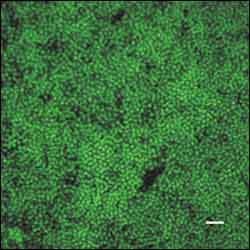Heat-controlled Drug Implants Offer Hope for Future

Fluorescently tagged insulin occupies a three-layer microgel thin film
Researchers at the Georgia Institute of Technology have developed a material that may one day allow patients to forgo daily injections and pills and receive prescriptions instead through micro-thin implantable films that release medication according to changes in temperature. The research, detailing results from testing insulin release in the lab, appears in the September 13 edition of the journal, Biomacromolecules.
“We loaded insulin in layers of microgel films in the lab and released bursts of insulin by applying heat to the films. They were extremely stable and could continue to release the drug for more than one month at a time,” said L. Andrew Lyon, associate professor at Georgia Tech’s School of Chemistry and Biochemistry.
The results add to a decade’s worth of work in controlled and targeted drug delivery. Lyon’s usage of using films assembled from microparticles allows more control over drug release than films previously made in monolithic form.
The insulin tests, said Lyon, serve as proof of a concept that this method of drug delivery is worth further investigation. Currently, the films release their cargo at 31 C, six degrees below human body temperature, but Lyon’s group is working on pushing the release point to a temperature slightly above that of the human body. Once implanted, the pharmaceutical-loaded films could be placed on chips with resistive heaters and scheduled to release drugs according to a time schedule or another trigger.
“One potential use is tying the implant to a blood glucose monitor using radio frequency (RF) technology,” said Lyon. “When the monitor detects that a diabetic patients has low blood sugar, it could send a signal to the chip to heat the film and release insulin into the bloodstream.”
Patients undergoing hormone therapy, chemotherapy or other treatments requiring periodic medication could conceivably get their dosages this way.
“Of course using these films to deliver medications in humans would require many more trials, said Lyon. “We believe we’ve taken an important step in new methods of drug delivery.”
Media Contact
More Information:
http://www.gatech.eduAll latest news from the category: Health and Medicine
This subject area encompasses research and studies in the field of human medicine.
Among the wide-ranging list of topics covered here are anesthesiology, anatomy, surgery, human genetics, hygiene and environmental medicine, internal medicine, neurology, pharmacology, physiology, urology and dental medicine.
Newest articles

A universal framework for spatial biology
SpatialData is a freely accessible tool to unify and integrate data from different omics technologies accounting for spatial information, which can provide holistic insights into health and disease. Biological processes…

How complex biological processes arise
A $20 million grant from the U.S. National Science Foundation (NSF) will support the establishment and operation of the National Synthesis Center for Emergence in the Molecular and Cellular Sciences (NCEMS) at…

Airborne single-photon lidar system achieves high-resolution 3D imaging
Compact, low-power system opens doors for photon-efficient drone and satellite-based environmental monitoring and mapping. Researchers have developed a compact and lightweight single-photon airborne lidar system that can acquire high-resolution 3D…





















